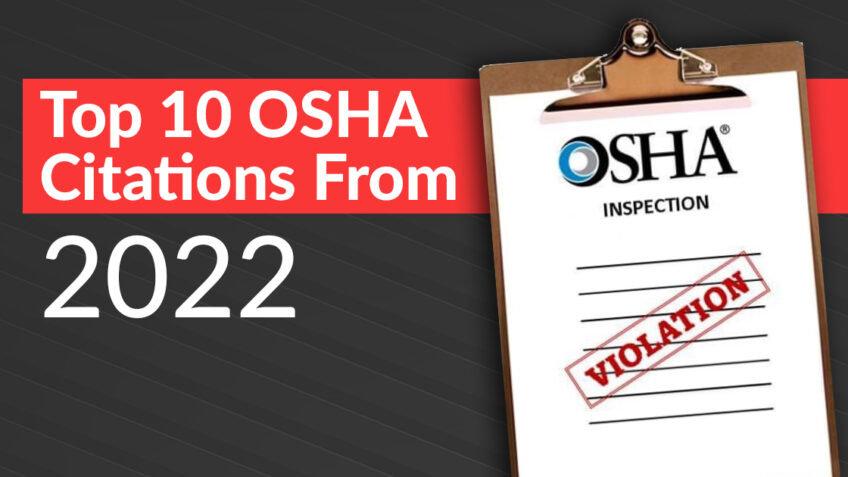
Top 10 OSHA Citations From 2022
Workplace safety is a top priority for employees and employers alike. The Occupational Safety and Health Administration (OSHA) has identified the top 10 most frequently cited workplace safety violations in the United States. By understanding these violations, employers can take steps to prevent them, protect their employees from harm and avoid these all too common fines.
#1 FALL PROTECTION
Falls are the number one cause of injuries and deaths amongst employees for the 12th year in a row. It is critical for businesses to instill better awareness and safety practices in their workforce. Regular onsite inspections by qualified personnel should be implemented in order to check for holes, slippery surfaces or other tripping hazards. The construction industry is the most affected by this standard. (See OSHA Standard 1926.501 and DWC’s Fall Protection for the Construction Industry Workplace Program, English/Spanish.)
#2 HAZARD COMMUNICATION
Employers must provide employees with clear information about hazardous chemicals in the workplace, including proper labeling, safety data sheets, and training on how to handle the chemicals safely. (See OSHA Standard 1910.1200; DWC’s Hazard Communication Fact Sheet, English/Spanish; and DWC’s SDS Safety Training Program, English/Spanish.)
#3 RESPIRATORY PROTECTION
Respiratory protection moves up to second most cited violation by OSHA. Many workplace citations could be avoided through better training programs, proper labeling and warnings. Your business should regularly educate and train employees on safety awareness. Having a safety protocol in place can help make your working environment a safer place for everyone. The medical, manufacturing and automotive repair industries were the most affected. (See OSHA Standard 1910.134 and related OSHA resources.)
#4 LADDERS
Bad ladder safety practices can be deadly. Never place a ladder on a step or uneven ground, split loads into multiple trips and always wear personal protection. The construction industry is by far the most affected by this violation. (See OSHA Standard 1926.1053 and DWC’s Ladder Safety 5-Minute Safety Training Aid, English/Spanish.)
#5 SCAFFOLDING
Improper decking and planking or the lack of tipping restraints can lead to catastrophic failures and dangerous situations. We recommend performing daily inspections of the structure by qualified personnel to ensure maximum safety. (See OSHA Standard 1926.451 and DWC’s Scaffold Safety Checklist, English.)
#6 LOCKOUT / TAGOUT
Operating dangerous machinery should always come with rigorous safety training on maintenance and operational procedures. Always make sure to keep your staff up to date on current practices and to train new employees. Regular inspections should be performed on machinery. (See OSHA Standard 1910.147; DWC’s Lockout/Tagout Fact Sheet, English/Spanish; and DWC’s Lockout/Tagout Workplace Program, English/Spanish.)
#7 POWERED INDUSTRIAL TRUCKS
Industrial trucks are a common cause for accidents and citations amongst warehousing, manufacturing and recycling industries. Employees should be trained and qualified to safely operate and maintain the vehicles. We recommend regular safety training and maintenance programs to ensure awareness at all times.(See OSHA Standard 1910.178; DWC’s Forklift Safety-Proper Load Handling 5-Minute Safety Training Aid, English/Spanish); and DWC’s Forklift Safety-Rules of the Road 5-Minute Safety Training Aid, English/Spanish.)
#8 FALL PROTECTION TRAINING
Falls are the #1 cause of injuries and deaths in the workplace, and many of them could be avoided by more thorough training and protocols. These training should be re-evaluated on an annual basis and be performed by adequate personnel. (See OSHA Standard 1926.503 and DWC’s Fall Protection for the Construction Industry Sample Written Program, English/Spanish.)
#9 PPE (PERSONAL PROTECTION EQUIPMENT)
Employers should provide eye and face protection when required along with formal training programs. Businesses are also responsible for storage and cleaning of the equipment. (See OSHA Standard 1926.102 and DWC’s Personal Protective Equipment Workplace Program, English.)
#10 MACHINE GUARDING
Machine guarding includes, blade protection, securing and fixing machines to floor/walls to avoid tipping, protecting employees against dangerous debris or contraptions. (See OSHA Standard 1910.212 and DWC’s Machine Guarding Fact Sheet, English/Spanish.)
KEY TAKEAWAYS
We encourage you to use this list to assess potential hazards in your own workplace and gaps in your safety programs.
Our partnership with OutlookHR can help you design a custom safety program tailored to your business needs. Get access to safety webinars, phone consultations, online safety evaluations, and over 1,000 interactive PDFs in English and Spanish as part of our CORE Safety Program. We can also provide on-site instructor safety training and regular inspections. We want to help you focus on what you do best, and let our experts protect your business from Cal / OSHA citations through better safety management.
We don’t just provide you with a one size fits all solution, we match you with an HR package tailored to your business needs.
About OutlookHR
Human Resources play a key role in the organization’s understanding of the latest labor laws,
lawful recruitment and hiring practices, mandatory trainings and bookkeeping of up-to-date employee
handbooks and workplace notices. Our partnership with Colony West puts us at the forefront of the latest
changes in local, state and federal labor laws to ensure your company is never at risk.
